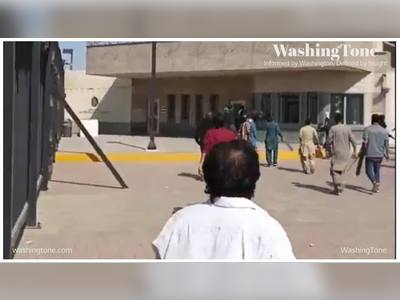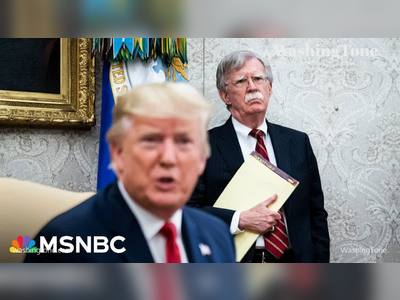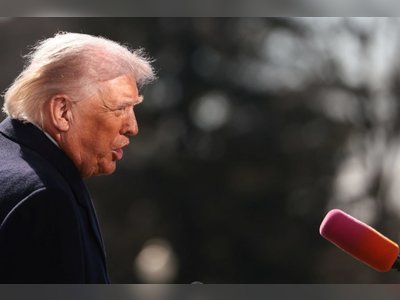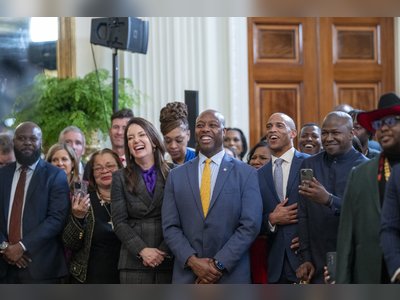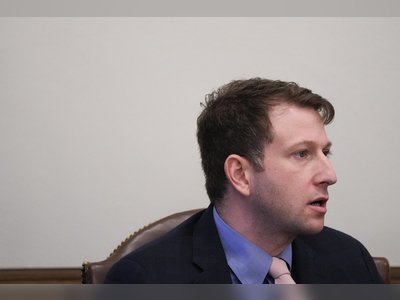White HouseSenateThe HouseSupreme CourtFederal ReserveDOJState DepartmentTreasuryCensusBudget OfficeTrade Representative
WashingTone
Informed by Washington, Defined by Insight
Monday, Mar 02, 2026
WashingTone

U.S.-Taiwan Collaboration on Expanding Taiwan's Role in Global Organizations
The U.S. and Taiwan work together to enhance Taiwan's participation in international forums, amidst rising global challenges and geopolitical tensions.
WASHINGTON — On January 8, 2025, representatives from the U.S. Department of State and the Taiwan Ministry of Foreign Affairs met in Washington, convened by the American Institute in Taiwan (AIT) and the Taipei Economic and Cultural Representative Office in the United States (TECRO).
The focus of the meeting was on expanding Taiwan's meaningful participation in international organizations, especially within the United Nations system and other global forums such as the World Health Assembly (WHA), the International Civil Aviation Organization (ICAO), and various non-UN international, regional, and multilateral bodies.
A Strategic Discussion on Global Engagement
The meeting reflected ongoing efforts by both the U.S. and Taiwan to find near-term opportunities for Taiwan to play a more active role in global governance.
Central to the discussions were Taiwan's contributions to critical global issues, such as public health, aviation safety, environmental protection, and law enforcement cooperation.
The U.S. delegation highlighted Taiwan’s exceptional expertise in these fields and emphasized the strategic value of including Taiwan in international forums that tackle global challenges.
Taiwan's absence from the World Health Organization (WHO) and ICAO has been a point of contention in international diplomacy for years, with Taiwan consistently excluded from decision-making processes in these essential global bodies despite its robust contributions to international public health, aviation safety, and disaster response.
The U.S. has long advocated for Taiwan's meaningful participation in these organizations, framing Taiwan’s inclusion as a matter of fairness and a recognition of its contributions to global well-being.
The One China Policy and U.S. Support for Taiwan
The discussions also underscored the delicate balance between U.S. support for Taiwan's participation in international organizations and its adherence to the one China policy, which remains a cornerstone of U.S.-China relations.
While the U.S. does not officially recognize Taiwan as a sovereign state, its actions, including this meeting, reflect a strategic effort to support Taiwan's international engagement in areas that have global significance.
U.S. representatives reiterated that this support is in alignment with the Taiwan Relations Act, which guides U.S.-Taiwan relations and the broader framework of three Joint Communiques and the Six Assurances.
These documents establish a diplomatic stance that seeks to prevent a unilateral change to the status quo in the Taiwan Strait while allowing Taiwan to maintain robust informal relationships with the international community.
The U.S. has also committed to ensuring Taiwan’s participation in international organizations, particularly in cases where Taiwan's exclusion hinders global progress.
This includes areas like public health, where Taiwan’s experience with disease outbreaks like SARS and COVID-19 has proven to be invaluable.
The U.S. support for Taiwan’s inclusion in global organizations is framed not as an act of defiance but as an effort to strengthen international cooperation.
Geopolitical Tensions and Taiwan’s Global Role
The meeting's timing is significant, coming amid increasing tensions between the U.S. and China.
Beijing has long opposed Taiwan’s participation in the UN and other multilateral forums, viewing Taiwan as a renegade province rather than a legitimate international actor.
This opposition has been one of the major obstacles to Taiwan’s inclusion in the WHO, ICAO, and other international bodies.
China’s diplomatic efforts to isolate Taiwan have put significant pressure on organizations to exclude Taiwan, even though Taiwan's expertise in several fields is recognized globally.
However, the U.S. has consistently championed Taiwan's inclusion, citing not only the island’s capabilities but also its strategic importance.
As global challenges such as pandemics, environmental crises, and international security threats increasingly require multilateral cooperation, Taiwan’s role as a contributor to these efforts is becoming more difficult to overlook.
Shared Global Concerns: Health, Security, and Environmental Protection
The U.S. and Taiwan discussed multiple areas where Taiwan's expertise could be leveraged to address global challenges.
In health, Taiwan has made significant strides in disease prevention and response, often providing assistance to countries in need of medical expertise and resources.
Taiwan’s public health systems were highly lauded during the COVID-19 pandemic for their proactive measures and rapid response, earning them praise from international public health experts.
In aviation, Taiwan's contributions to aviation safety and security have been indispensable, particularly in the Asia-Pacific region.
As global aviation increasingly becomes a focus for regulatory bodies, Taiwan's inclusion in ICAO is seen as a critical step for advancing international safety standards.
Environmental protection, another key area of discussion, also benefits from Taiwan’s involvement.
Taiwan has been an advocate for environmental sustainability in the Asia-Pacific region and globally, working to reduce carbon emissions, preserve biodiversity, and combat pollution.
These efforts align with the global agenda for addressing climate change and its impacts.
Law enforcement cooperation, especially in areas such as transnational crime and cybersecurity, was another area where Taiwan’s contributions were recognized.
As a major player in the tech industry, Taiwan has a wealth of knowledge and capabilities to assist in global law enforcement efforts, particularly in combating cybercrime and human trafficking.
The Way Forward: Continued Advocacy and Multilateral Support
While the U.S. and Taiwan's efforts to integrate Taiwan into international organizations continue, the path forward remains complex and fraught with geopolitical tensions.
However, the recent discussions signal a renewed commitment by the U.S. to support Taiwan's meaningful participation in international forums where its contributions can benefit global efforts to solve pressing challenges.
The international community, including those nations that share similar values and concerns regarding Taiwan’s exclusion, must continue to build consensus on the importance of Taiwan’s inclusion in global governance.
Taiwan’s exclusion, the U.S. argues, undermines the effectiveness of international organizations, which would benefit from Taiwan’s participation in solving issues that transcend national borders.
The U.S.-Taiwan Working Group meeting on international organizations underscores the shared commitment between the two entities to ensure that Taiwan can play its rightful role on the world stage.
Moving forward, the success of these efforts will depend on a delicate balance of diplomacy, advocacy, and strategic engagement with partners who understand the importance of inclusivity in global governance.
The focus of the meeting was on expanding Taiwan's meaningful participation in international organizations, especially within the United Nations system and other global forums such as the World Health Assembly (WHA), the International Civil Aviation Organization (ICAO), and various non-UN international, regional, and multilateral bodies.
A Strategic Discussion on Global Engagement
The meeting reflected ongoing efforts by both the U.S. and Taiwan to find near-term opportunities for Taiwan to play a more active role in global governance.
Central to the discussions were Taiwan's contributions to critical global issues, such as public health, aviation safety, environmental protection, and law enforcement cooperation.
The U.S. delegation highlighted Taiwan’s exceptional expertise in these fields and emphasized the strategic value of including Taiwan in international forums that tackle global challenges.
Taiwan's absence from the World Health Organization (WHO) and ICAO has been a point of contention in international diplomacy for years, with Taiwan consistently excluded from decision-making processes in these essential global bodies despite its robust contributions to international public health, aviation safety, and disaster response.
The U.S. has long advocated for Taiwan's meaningful participation in these organizations, framing Taiwan’s inclusion as a matter of fairness and a recognition of its contributions to global well-being.
The One China Policy and U.S. Support for Taiwan
The discussions also underscored the delicate balance between U.S. support for Taiwan's participation in international organizations and its adherence to the one China policy, which remains a cornerstone of U.S.-China relations.
While the U.S. does not officially recognize Taiwan as a sovereign state, its actions, including this meeting, reflect a strategic effort to support Taiwan's international engagement in areas that have global significance.
U.S. representatives reiterated that this support is in alignment with the Taiwan Relations Act, which guides U.S.-Taiwan relations and the broader framework of three Joint Communiques and the Six Assurances.
These documents establish a diplomatic stance that seeks to prevent a unilateral change to the status quo in the Taiwan Strait while allowing Taiwan to maintain robust informal relationships with the international community.
The U.S. has also committed to ensuring Taiwan’s participation in international organizations, particularly in cases where Taiwan's exclusion hinders global progress.
This includes areas like public health, where Taiwan’s experience with disease outbreaks like SARS and COVID-19 has proven to be invaluable.
The U.S. support for Taiwan’s inclusion in global organizations is framed not as an act of defiance but as an effort to strengthen international cooperation.
Geopolitical Tensions and Taiwan’s Global Role
The meeting's timing is significant, coming amid increasing tensions between the U.S. and China.
Beijing has long opposed Taiwan’s participation in the UN and other multilateral forums, viewing Taiwan as a renegade province rather than a legitimate international actor.
This opposition has been one of the major obstacles to Taiwan’s inclusion in the WHO, ICAO, and other international bodies.
China’s diplomatic efforts to isolate Taiwan have put significant pressure on organizations to exclude Taiwan, even though Taiwan's expertise in several fields is recognized globally.
However, the U.S. has consistently championed Taiwan's inclusion, citing not only the island’s capabilities but also its strategic importance.
As global challenges such as pandemics, environmental crises, and international security threats increasingly require multilateral cooperation, Taiwan’s role as a contributor to these efforts is becoming more difficult to overlook.
Shared Global Concerns: Health, Security, and Environmental Protection
The U.S. and Taiwan discussed multiple areas where Taiwan's expertise could be leveraged to address global challenges.
In health, Taiwan has made significant strides in disease prevention and response, often providing assistance to countries in need of medical expertise and resources.
Taiwan’s public health systems were highly lauded during the COVID-19 pandemic for their proactive measures and rapid response, earning them praise from international public health experts.
In aviation, Taiwan's contributions to aviation safety and security have been indispensable, particularly in the Asia-Pacific region.
As global aviation increasingly becomes a focus for regulatory bodies, Taiwan's inclusion in ICAO is seen as a critical step for advancing international safety standards.
Environmental protection, another key area of discussion, also benefits from Taiwan’s involvement.
Taiwan has been an advocate for environmental sustainability in the Asia-Pacific region and globally, working to reduce carbon emissions, preserve biodiversity, and combat pollution.
These efforts align with the global agenda for addressing climate change and its impacts.
Law enforcement cooperation, especially in areas such as transnational crime and cybersecurity, was another area where Taiwan’s contributions were recognized.
As a major player in the tech industry, Taiwan has a wealth of knowledge and capabilities to assist in global law enforcement efforts, particularly in combating cybercrime and human trafficking.
The Way Forward: Continued Advocacy and Multilateral Support
While the U.S. and Taiwan's efforts to integrate Taiwan into international organizations continue, the path forward remains complex and fraught with geopolitical tensions.
However, the recent discussions signal a renewed commitment by the U.S. to support Taiwan's meaningful participation in international forums where its contributions can benefit global efforts to solve pressing challenges.
The international community, including those nations that share similar values and concerns regarding Taiwan’s exclusion, must continue to build consensus on the importance of Taiwan’s inclusion in global governance.
Taiwan’s exclusion, the U.S. argues, undermines the effectiveness of international organizations, which would benefit from Taiwan’s participation in solving issues that transcend national borders.
The U.S.-Taiwan Working Group meeting on international organizations underscores the shared commitment between the two entities to ensure that Taiwan can play its rightful role on the world stage.
Moving forward, the success of these efforts will depend on a delicate balance of diplomacy, advocacy, and strategic engagement with partners who understand the importance of inclusivity in global governance.
